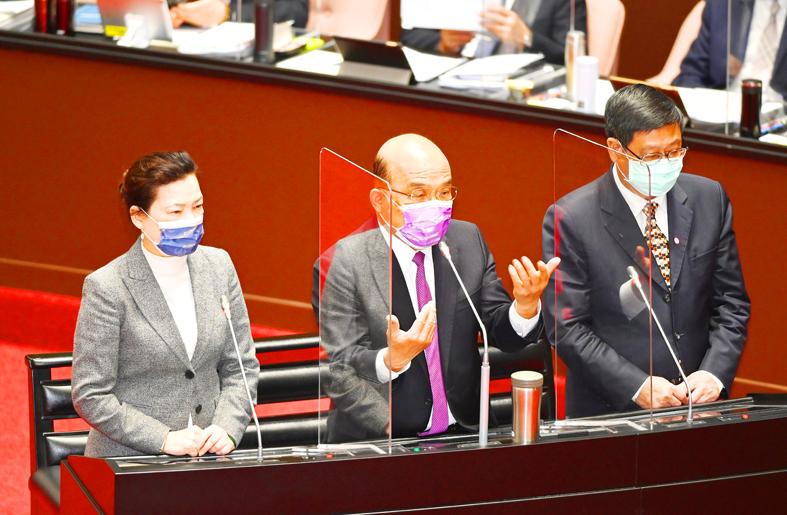Lawmakers should stop treating government officials “like dogs,” Premier Su Tseng-chang (蘇貞昌) said yesterday during a plenary legislative session.
The remark came after the Chinese Nationalist Party (KMT) caucus proposed “banning retorting” from government officials while being questioned by lawmakers at plenary sessions.
KMT Legislator Chiang Wan-an (蔣萬安) during a session on Friday last week asked Su for a promise that there would be no more power outages in Taiwan.

Photo: Tien Yu-hua, Taipei Times
“Your grandfather promised to fight and recover mainland China,” Su said in response.
Su was referring to the alleged family lineage of Chiang as grandson of Chiang Kai-shek (蔣介石).
In yesterday’s session, the KMT caucus asked Legislative Speaker You Si-kun (游錫堃) to rein in government officials from retorting when being questioned by lawmakers, and prohibiting them from asking lawmakers questions in return.
The KMT also called for a bill that would ban retorting.
“We have seen lawmakers in the past heaping abuse and treating government officials like dogs. We should let this behavior remain in the past,” Su told reporters after the session.
“During the plenary session’s question period, lawmakers have the right to query government officials. Lawmakers also have protection under the legislative immunity. Given all these, they still want to amend the law to further protect themselves. People would think these lawmakers are too weak,” Su said.
All ministers and officials wish to explain government policies when being questioned, but they are not given the opportunity, he added.
“Lawmakers often begin questioning with scornful, disparaging remarks, sometimes even with swearing,” he said. “Outstanding professionals in the past have declined Cabinet position offers. A reason often cited was that they were not willing to face abuse and personal attacks by lawmakers.”
“The legislature is our nation’s highest body for elected representatives from all local constituencies, and the best way for lawmakers to do their job is to bolster their own knowledge for questioning officials,” You said in a statement in response to the KMT’s proposal.
“Legislative sessions are for deliberation and oversight on government policies, to discuss and debate between political parties,” You said. “Lawmakers should have a strong ability to respond to retorts by government officials.”

DEFENSE: The National Security Bureau promised to expand communication and intelligence cooperation with global partners and enhance its strategic analytical skills China has not only increased military exercises and “gray zone” tactics against Taiwan this year, but also continues to recruit military personnel for espionage, the National Security Bureau (NSB) said yesterday in a report to the Legislative Yuan. The bureau submitted the report ahead of NSB Director-General Tsai Ming-yen’s (蔡明彥) appearance before the Foreign and National Defense Committee today. Last year, the Chinese People’s Liberation Army (PLA) conducted “Joint Sword-2024A and B” military exercises targeting Taiwan and carried out 40 combat readiness patrols, the bureau said. In addition, Chinese military aircraft entered Taiwan’s airspace 3,070 times last year, up about

The Overseas Community Affairs Council (OCAC) yesterday announced a fundraising campaign to support survivors of the magnitude 7.7 earthquake that struck Myanmar on March 28, with two prayer events scheduled in Taipei and Taichung later this week. “While initial rescue operations have concluded [in Myanmar], many survivors are now facing increasingly difficult living conditions,” OCAC Minister Hsu Chia-ching (徐佳青) told a news conference in Taipei. The fundraising campaign, which runs through May 31, is focused on supporting the reconstruction of damaged overseas compatriot schools, assisting students from Myanmar in Taiwan, and providing essential items, such as drinking water, food and medical supplies,

STRICTER ENFORCEMENT: Taipei authorities warned against drunk cycling after a sharp rise in riding under the influence, urging greater public awareness of its illegality Taipei authorities have issued a public warning urging people not to ride bicycles after consuming alcohol, following a sharp rise in riding under the influence (DUI) cases involving bicycles. Five hundred and seven people were charged with DUI last year while riding YouBikes, personal bicycles, or other self-propelled two-wheelers — a fourfold increase from the previous year, data released by the Taipei Police Department’s Traffic Division showed. Of these, 33 cases were considered severe enough to be prosecuted under “offenses against public safety,” the data showed. Under the Road Traffic Management and Penalty Act (道路交通管理處罰條例), bicycles — including YouBikes and other

A magnitude 4.3 earthquake struck eastern Taiwan's Hualien County at 8:31am today, according to the Central Weather Administration (CWA). The epicenter of the temblor was located in Hualien County, about 70.3 kilometers south southwest of Hualien County Hall, at a depth of 23.2km, according to the administration. There were no immediate reports of damage resulting from the quake. The earthquake's intensity, which gauges the actual effect of a temblor, was highest in Taitung County, where it measured 3 on Taiwan's 7-tier intensity scale. The quake also measured an intensity of 2 in Hualien and Nantou counties, the CWA said.